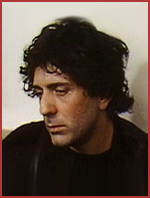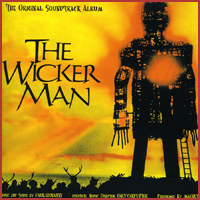
By JASON COMERFORD Less an outright horror film than an eerily foreboding mystery, Robin Hardy’s The Wicker Man has retained a cult following ever since its release in 1973. Matinee audiences expecting a Hammer-style gothic chiller were no doubt surprised by the film’s challenging mixture of theological conflict and earthy eroticism, as sexually-repressed police sergeant Neil Howie (Edward Woodward) travels to the remote island community of Summerisle to investigate the disappearance of a young girl. The devoutly celibate Howie quickly finds himself challenged and shaken by the defiantly pre-Christian customs of the natives, led by the commanding Lord Summerisle (genre icon Christopher Lee), leading to an unforgettable finale where Howie discovers the true purpose of his visit to the island. Production of the film was plagued by troubles both financial and creative, leading to the film being released in a bowdlerized 87-minute cut that Hardy and his stars publicly criticized. The film was well-received but the box-office returns were scant, and it slipped into obscurity until several subsequent restoration efforts unearthed Hardy’s original cut; the most recent, purporting to be a definitive version, is due for release in the UK later this month. Hardy’s unconventional filmmaking methods extended to the music of the film, contributed by American composer Paul Giovanni with Magnet, a folk-rock group Giovanni put together especially for the project. Giovanni and his team, including the film’s associate music director Gary Carpenter, spent six weeks in late summer 1972 researching, writing and recording a series of folk songs based on a wide variety of influences, including medieval English chants, Gaelic folk music, nursery rhymes, and even the poetry of Robert Burns. The lack of a traditional approach mirrors Howie’s descent into an unfamiliar world, and the cunning blend of ancient and modern sounds keeps the viewer (and listener) on edge throughout. An unquestionable highlight of the film and soundtrack is “Willow’s Song,” as the free-spirited temptress Willow (Britt Ekland) dances nude in a room adjacent to Howie’s, driving him into a frenzy with such unambiguous lyrics as, “How a maid can milk a bull! / And every stroke a bucketful.” The tug-of-war between Howie’s devout Christian ideals and the islanders’ polytheistic practices forms the real core of the plot, and Hardy avoids the potentially exploitative elements of the sequence by instead building the tension out of Howie’s frustration and discomfort, giving the character a critical test he must pass in order to stay true to his beliefs. Both placid and teasingly ambiguous, “Willow’s Song” has proven to be Giovanni’s most enduringly popular composition; artists who have covered it in subsequent years include the Sneaker Pimps (as “How Do”), Isobel Campbell, The Mock Turtles, and Faith and the Muse. The soundtrack to The Wicker Man was first released in a mono version drawn from a music & effects track by Trunk Records in 1998; Silva Screen released a properly restored stereo version in 2002 in the UK, which was subsequently released to US audiences in 2010. What do you think? Click here to submit a comment |
Click [here] to listen to a sample
Installment Prize: A prize will be awarded at the What do you think? Click here to submit a comment Relevant Websites: THE WICKER MAN CD (Amazon) Ken Wannberg, Rick Wilkins and |
|
| David W. | "How a maid can milk a bull! / And every stroke a bucketful."ť ....OK....
I must admit I have never seen the original. Only the Nick Cage one.
|
|
| Peloquin | When I was a child, I had seen this film and really at the time was terrified. Not only from the theme, but the whole twists and turns to the end. I came to realize that seeing it again as an adult my fear was less, though it still freaks me out. About the score, I think it was the first I had heard with a mix of sound bites and strange songs in one place.
|
|
| Tim | You've chosen one of my favourite horror films, one that my dad actually introduced me to even though he didn't really like horror films. Exquisite soundtrack for a unique movie experience.
|
|
| Jonathan | That movie outline sounds weird, but since the soundtrack was released I will check out the compositions of Paul Giovanni. I don't think he did any other soundtracks, did he?
|
|
| Howlin' Wolf | Jonathan - It seems you are correct about The Wicker Man being Paul Giovanni's only score. Wikipedia - Paul Giovanni (1933 – June 17, 1990) was an American playwright, actor, director, singer and musician. New Yorker Giovanni is best known for writing the music for the 1973 British horror film The Wicker Man. The soundtrack, which was eventually released by itself in 2002, incorporates folk song, a setting of a poem by Robert Burns and new material composed by Giovanni, who also contributed some lyrics. The music was played by folk-rock group Magnet using a combination of traditional and modern (electric) instrumentation; some parts of the soundtrack were augmented by brass instruments. After this Giovanni returned to New York where his play The Crucifer of Blood was performed. It was later filmed for TV. Giovanni also composed a musical entitled Shot Through The Heart, which is yet to be performed. He did graduate studies at The Catholic University of America Speech and Drama Department under Rev. Gilbert V. Hartke, OP. He died from pneumonia with complications on June 17, 1990.[1] |
|
| Alan | Two words: Christopher Lee. I think he once mentioned that this was his favorite film. It is certainly a departure from his usual Hammer roles.
The songs and music are well written and performed. It's playing as I type this... |
|
| David Kessler | This soundtrack suits the movie so perfectly and "Willow´s Song" is the most hyphnotic tune I have ever heard and the "Corn Rigs" song is so perfect too...
A movie I can´t put my thumb on but it has something special No other movie has...this is an era movie as good as it gets |
|
| Mike | I've never seen the film and am not familiar with the music, but this article definitely has me intrigued by both. Interesting that the score's influences were "medieval English chants, Gaelic folk music, nursery rhymes, and even the poetry of Robert Burns." That beautiful sample called "Willow's Song" struck me as a cross between a love song and a lullaby. | |
| Jeff | I still have yet to see this movie. It seems like one of those movies that you have to be in a certain mood to watch. Hopefully, I'll get to it this Halloween season. Maybe I'll watch the remake just for comparison's sake. | |


